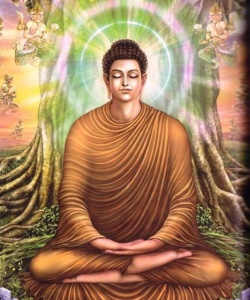Difference between revisions of "Manicora Jataka: The Virtuous Wife"
| Line 40: | Line 40: | ||
The just [[king]] reigned wisely, and in due [[time]] went to swell the hosts of [[heaven]]. | The just [[king]] reigned wisely, and in due [[time]] went to swell the hosts of [[heaven]]. | ||
| − | At the end of this {{Wiki|discourse}}, the [[Buddha]] identified the [[Birth]]: "At that [[time]] [[Devadatta]] was the wicked [[king]]; [[Anuruddha]] was [[Sakka]]; [[Rahula's]] mother | + | At the end of this {{Wiki|discourse}}, the [[Buddha]] identified the [[Birth]]: "At that [[time]] [[Devadatta]] was the wicked [[king]]; [[Anuruddha]] was [[Sakka]]; [[Rahula's]] mother<ref>A name for Yasodhara, the Buddha's wife and mother of his son Rahula, who was born before he renounced the world.</ref> was [[Sujata]]; and I myself was the [[king]] proclaimed by [[Sakka]]." |
| − | + | {{reflist}} | |
{{R}} | {{R}} | ||
"Jataka Tales of the Buddha: Part IV", retold by Ken & Visakha Kawasaki. Access to Insight (Legacy Edition), 30 November 2013, http://www.accesstoinsight.org/lib/authors/kawasaki/bl144.html . | "Jataka Tales of the Buddha: Part IV", retold by Ken & Visakha Kawasaki. Access to Insight (Legacy Edition), 30 November 2013, http://www.accesstoinsight.org/lib/authors/kawasaki/bl144.html . | ||
[[Category:Jataka Tales]] | [[Category:Jataka Tales]] | ||
Latest revision as of 07:42, 26 January 2014
During a stay in Veluvana, the Buddha heard that Devadatta intended to kill him. "Monks, this is not the first time that Devadatta has tried to kill me; he tried before and failed." Then he told them this story of the past.
Long, long ago, when Brahmadatta was reigning in Baranasi, in a village not far from the capital the Bodhisatta was born as the son of a householder. When he became a young man, he married a well-bred young lady from Baranasi. She was a fair and graceful maiden named Sujata. She became a virtuous wife, faithfully serving her husband and his parents. The young man loved his wife very much, and the two of them lived together in joy, harmony, and oneness of mind.
One day Sujata said to her husband, "I would like to see my mother and father again after such a long time."
"Very well, my dear," he replied "Please prepare food for us for the journey."
They loaded a cart with provisions and gifts. He sat in front to drive, and she sat behind. As soon as they reached the outskirts of Baranasi, they stopped to rest, and he unyoked the oxen. After they had washed and eaten their meal, Sujata changed her clothes and adorned herself. Quite refreshed, her husband yoked the oxen again and climbed up into the driver's seat. Sujata sat down again in the back, and they resumed their journey.
As they entered the city, Sujata stepped down from the cart and walked behind it. The king of Baranasi happened to be passing in procession on the back of his splendid royal elephant and saw her. He was so attracted by her beauty that he ordered one of his men to go and find out whether or not she had a husband.
"I am told she has a husband, sire," the servant reported. "Do you see that man driving the cart? That is her husband."
The king could not control his passion. "I will get rid of that fellow," he thought, "and take the wife for myself." A vicious plan began forming in his mind, and he called his servant again. "Take this ornament," he said to the servant, handing him a beautiful jeweled crest, "and walk past that man's wagon. As you pass by, casually drop the jewel into the wagon without letting anyone see what you are doing. As soon as you have done it, report back to me." The servant did exactly as he was told.
"I have lost a jeweled crest!" cried the king. "Shut all the gates! Catch the thief!" The news spread rapidly, and the city was soon in an uproar.
The servant immediately set out with soldiers and accosted Sujata's husband. "Hey, you!" he shouted. "Stop that cart! The king has lost a jewel, and we must search your wagon." Of course, he quickly found the jeweled crest which he himself had put there a few minutes before. "Thief!" he cried, grabbing hold of the young man. The soldiers immediately seized him and beat him. They tied his arms behind his back and dragged him before the king.
"Here's the thief who stole your jewel!" they cried.
"Off with his head!" the king commanded excitedly.
The soldiers led the young man away, striking him with whips at every corner until they reached the south gate. Sujata ran after him, stretching out her arms and wailing, "Dearest husband, it is I who got you into this wretched predicament!"
Just outside the city, the king's servants threw him down and prepared to cut off his head. When she saw her beloved husband about to be executed, Sujata reflected on her own virtue and cried, "No gods are here! They must be far away. There can be no gods here or they would stop these cruel men from slaying my innocent husband!"
While the virtuous Sujata reproached the heavens in this way, Sakka, king of the gods, noticed that his throne was growing hot. "Who is trying to make me fall from my position?" he wondered. He immediately became aware of what was happening. "Ah!" he thought, "The king of Baranasi is doing a very evil deed. He is making the worthy Sujata suffer. I must go there at once!"
Swiftly descending from his heaven, Sakka plucked the wicked king from the royal elephant and laid him down on the execution ground. In the same instant he snatched Sujata's husband from the execution place, dressed him in the king's robes, and set him on the back of the king's elephant.
The executioner lifted his axe and cut off a head — but it was the king's head, and as soon as the blow was struck everyone realized it was the king's.
Then Sakka appeared to the crowd, stood in front of the young man, and consecrated him as king with Sujata his queen. All the courtiers, brahmans, householders, and other citizens rejoiced. "The unjust king is dead!" they cried. "Sakka himself has given us a righteous king!"
Sakka stood poised in the air and declared, "This upright king shall rule you virtuously. Because he was unrighteous, the evil king was slain. If a king is immoral, the gods send rain out of season, and in season there is no rain. If the king is evil, three great fears torment men — fear of famine, fear of pestilence, and fear of the sword. This righteous king has been sent to you from heaven." Having thus admonished the people, Sakka returned to his divine abode.
The just king reigned wisely, and in due time went to swell the hosts of heaven.
At the end of this discourse, the Buddha identified the Birth: "At that time Devadatta was the wicked king; Anuruddha was Sakka; Rahula's mother[1] was Sujata; and I myself was the king proclaimed by Sakka."
Footnotes
- ↑ A name for Yasodhara, the Buddha's wife and mother of his son Rahula, who was born before he renounced the world.
Source
"Jataka Tales of the Buddha: Part IV", retold by Ken & Visakha Kawasaki. Access to Insight (Legacy Edition), 30 November 2013, http://www.accesstoinsight.org/lib/authors/kawasaki/bl144.html .

